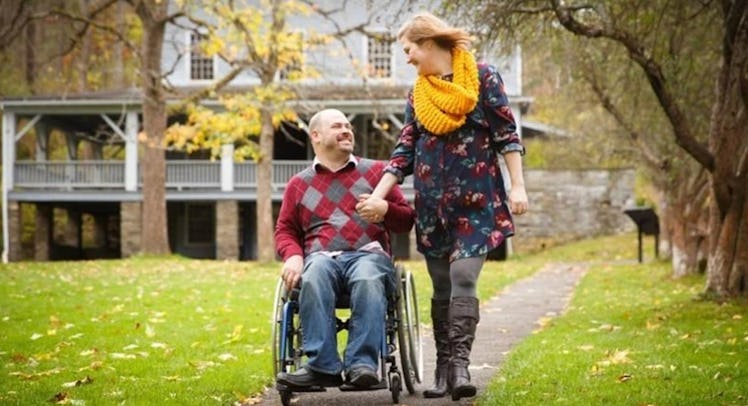Being In A Wheelchair Doesn't Make Me Less Of A Father
"Being a parent is hard. And it’s harder when you’re disabled."

The following was syndicated from Parenting On Wheels for The Fatherly Forum, a community of parents and influencers with insights about work, family, and life.
Being a parent is hard. And it’s harder when you’re disabled, not in the least because we don’t really talk about disabled people having things like families. And while I have no delusions of grandeur, if even one person reads this and learns something new about disability, I’ve done my job. So I’m back, and ready to shed some more light on the uniqueness of parenting with a disability.
I have this theory that I’ve been operating under for a long time. It seems like the general public usually only sees 2 types of disabled people. Those who need full-time care and aren’t independent, and those who would get referred to as a “Super-crip,” (Not my term!). These are the types of people who do things like climb a mountain like total badasses and make national news.
The problem is, this leads to the mistaken assumption that all disabled people fall into these categories. When in reality, many of us are somewhere in between these extremes and just kind of live the same lives you non-disabled people do — just with better parking. Think this doesn’t happen? Think again. Once, I was leaving an Ithaca College football game, basking in the glow of another Bombers victory. As I’m walking out of the stadium, a man stops me and says “You’re doing great!” I really had no idea what he was referring to. All I’d done is yell for some defense and eat a hot dog. Then it hit me: He was referring to me walking outside.
Okay, in fairness, Ithaca’s Butterfield Stadium, while a great place to watch a game, isn’t the world’s most accessible place. But still, I’d gone to nearly 100 games there. To me, this was a natural place to be on a fall afternoon. And yet, this pretty normal activity elicited praise from a total stranger. Why? Because it fell into that not-talked-about middle zone.
I sometimes worry that when she’s older, she’ll wonder why I can’t do things the way my wife does them.
I mention this anecdote for 2 reasons. First, because any excuse to mention Ithaca College football is welcome on this blog. But mainly because yesterday, my wife was showing off my daughter Cora to a woman who lives in our apartment complex. This woman asked my wife, with all seriousness, if I was able to help take care of Cora. When my wife responded that yes, I was, this woman seemed legitimately astounded.
I’m not mad at this woman. For all I know, she hasn’t met many people in wheelchairs. She was older, which means she grew up in a time when handicapped people didn’t have the things they have now, like, you know, protection from the government. Sometimes, you don’t know what you don’t know.
But this made me realize something: As a society, usually when we say that handicapped people can do anything, we don’t show them doing “anything.” We show them climbing mountains and winning medals. We don’t show them living an everyday life. This is why a TV show like Speechless on ABC is so important. Because it shows the everyday life of a person with a disability. And we don’t show everyday life enough.
I’m not a super-parent. I don’t have everything figured out. A few weeks ago, my wife took our dog to the vet and left me home with the baby for an hour. In that span, I lost 3 pacifiers, changed a diaper, and when my wife came home, Cora was crying* and had no pants on.
*In fairness, she wasn’t crying the whole time my wife was gone.
The point is, I’m working on it. I can’t climb mountains. I can’t win medals. I do very little that is newsworthy. But you can be assured. I can take care of my daughter.
I can make a bottle and feed her.
I’ve taken care of myself for 34 years now, and other than a few emergency room trips, it’s gone pretty great. Taking care of my daughter is a whole new challenge, and one that I’m conquering every day. It’s not always pretty. If she’s sitting on my lap and I need to put her on my shoulder, it takes me a little while. Sometimes, to pick her up, I have to grab her shirt with one hand and support her head with the other. Diapers are still a work in progress.
I’m not a super-parent. I don’t have everything figured out.
Sometimes, Cora gets fussy when I do this stuff. I get it. My wife, Ashley, is a pro and a half at all these tasks. She’s the Julio Jones of raising a baby. She can do things on a level most of us only dream about reaching. Most days, I just try to be Taylor Gabriel and not mess up the easy stuff.
I think Cora understands this. She’s only 3 and a half months old, but she’s pretty smart. Sometimes, she’ll cry when I try to feed her, or burp her, or soothe her, and I imagine that she’s saying “No, Daddy! Do it like Mommy!” I sometimes worry that when she’s older, she’ll wonder why I can’t do things the way my wife does them.
But then other times, Cora will look at me like this, and I’ll remember: My daughter loves me a whole lot. And she knows I can care of her, and she’s grateful for that. So am I.
Patrick Bohn is a father with Cerebral Palsy who writes the blog Parenting on Wheels. He lives in upstate New York with his wife Ashley, their daughter Cora, and their dog, Banjo.
This article was originally published on